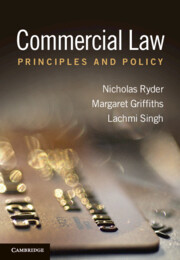Book contents
- Frontmatter
- Contents
- Preface
- List of abbreviations
- Table of Statutory Provisions
- Table of Cases
- Part 1 Agency
- Part 2 Sale of Goods and Services
- Part 3 International Trade and Sales
- Part 4 Tortious Liability for Defective Products
- Part 5 Unfair Commercial Practices
- Part 6 Banking and Finance Law
- Part 6 Chapter 1 Government Policy
- Part 6 Chapter 2 Banking and Finance Law
- Part 6 Chapter 3 Banking Regulation
- Part 7 Consumer Credit
- Bibliography
- Index
- References
Part 6 Chapter 2 - Banking and Finance Law
from Part 6 - Banking and Finance Law
Published online by Cambridge University Press: 05 August 2012
- Frontmatter
- Contents
- Preface
- List of abbreviations
- Table of Statutory Provisions
- Table of Cases
- Part 1 Agency
- Part 2 Sale of Goods and Services
- Part 3 International Trade and Sales
- Part 4 Tortious Liability for Defective Products
- Part 5 Unfair Commercial Practices
- Part 6 Banking and Finance Law
- Part 6 Chapter 1 Government Policy
- Part 6 Chapter 2 Banking and Finance Law
- Part 6 Chapter 3 Banking Regulation
- Part 7 Consumer Credit
- Bibliography
- Index
- References
Summary
Introduction
The purpose of this chapter is to provide a detailed overview of the law relating to banks. The chapter begins by attempting to answer what in theory should be a very simple question. What is a bank? However, it will become clear that this is quite a difficult question to answer. The chapter goes on to define a customer and then progresses to highlight the very complicated relationship between a bank and its customers. Particular attention is paid to the duties a bank owes to its customers, including the duty of confidentiality. The chapter also outlines the different types of bank accounts offered to customers and deals with some of the legal issues relating to cheques, e-banking and the regulation of bank accounts.
What is a bank?
The first question faced by students studying the law relating to banks is how do you define a bank? This is not an easy question to answer, a point raised by Wadsley and Penn, who took the view that:
[The question is] notoriously difficult to answer. The question has become much harder to answer in recent years, with the advent of telephone and Internet banking as well as banks in supermarkets. The traditional idea of a bank with many local branches dealing with customers face to face (core retail banking) seems odd and out of date.
- Type
- Chapter
- Information
- Commercial LawPrinciples and Policy, pp. 439 - 461Publisher: Cambridge University PressPrint publication year: 2012



